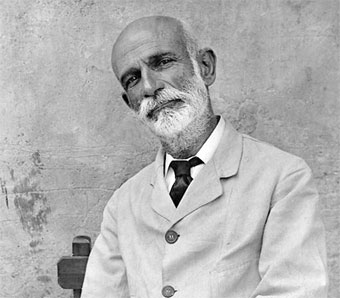Francisco Giner de los Ríos (Ronda, 1839–Madrid, 1915) was a Spanish educator, thinker and writer. He studied Law and Philosophy at the universities of Barcelona, Granada and Madrid. At the latter he met Sanz del Río, who was responsible for introducing to Spain the ideas of the German philosopher Krause; thenceforward he belonged to the core of Krausist thinkers (together with Salmerón, Moret, Azcárate and Labra...) who would greatly influence the thought and action of the Spanish liberals. This school advocated a rationalist ideal of social harmony based on ethical reform of the individual though education as the underpinning of a truly liberal state.
In 1867 he successfully completed a public examination to win the chair in Law and International Law at Madrid University, though he resigned a few months later in protest against the disciplinary action taken by the government against Sanz del Río. He returned to his chair following the triumph of the Revolution in 1868, was dismissed after Cánovas’s government restored the Bourbon monarchy (1875), and was finally reinstated again after Sagasta’s liberals came to power (1881).
In 1876 he founded the Institución Libre de Enseñanza, an undertaking to which he would devote the rest of his life; it was an educational centre based on modern,secular and progressive pedagogical methods that were advocated as an alternative to the official teaching dominated by the church. Giner left a very extensive written oeuvre on legal, philosophical, artistic and literary matters. From the founding of the Institución Libre de Enseñanza to the end of his days, he devoted himself wholeheartedly to putting into practice the educational ideas on which the institution was based: training people who would be useful to society, but above all people capable of embracing an ideal; coeducation and explicit recognition of women’s equal status to men; and rationalism, academic freedom, freedom of research, free choice of texts and abolishment of exams based on learning by rote. In short, it was an active, neutral and undogmatic school based on scientific method, which encompassed the student’s whole lifetime and set out to produce people with an all-round education receptive to all areas of human knowledge. Giner de los Ríos opposed freedom to authority.
Prominent among Giner de los Ríos’s many works and writings are Lecciones sumarias de psicología (1874), Estudios sobre educación (1886), Educación y Enseñanza (1889), Resumen de la filosofía del derecho (1898) and Pedagogía universitaria (1905).



